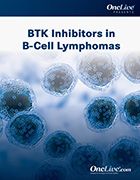Publication
Video
Dr. Kahl on BTK Inhibitor Time-Definite Trials in CLL
Author(s):
Brad Kahl, MD, discusses trials looking at time-definite therapy looking at BTK inhibitor combinations in chronic lymphocytic leukemia.
Brad Kahl, MD, professor in the Department of Medicine, Washington University School of Medicine in St. Louis, Siteman Cancer Center, discusses trials looking at time-definite therapy looking at BTK inhibitor combinations in chronic lymphocytic leukemia (CLL).
There are several trials combining ibrutinib (Imbruvica) with venetoclax (Venclexta) with or without a CD20-directed monoclonal antibody comparing indefinite therapy with time-definite therapy, explains Kahl. Time-definite therapy is beneficial for patients with CLL because, according to Kahl, it prevents being on therapy for many years and experiencing drug toxicity as well as financial toxicity.
Kahl is interested in seeing how these time-definite trials impact patient outcomes over time, and hopes they result in treatment options for patients with CLL.










